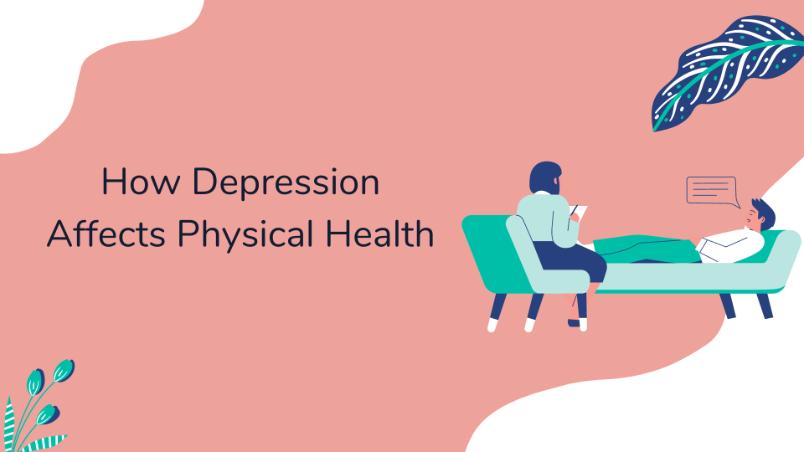Depression is a complex mental health disorder that impacts your emotional well-being and takes a significant toll on your physical health. While many know that depression leads to sadness, hopelessness, and lack of motivation, few realize its profound effects on various bodily systems.
This blog post explores the far-reaching effects of depression on physical health and the importance of addressing both mental and physical aspects.
Cardiovascular Impact
One of the most serious ways in which depression can impact physical health is by increasing the risk of cardiovascular problems. Studies have shown that individuals with chronic depression are more likely to develop heart disease compared to those without depression. This increased risk is attributed to several factors, including elevated levels of inflammation and stress hormones in the body.
Depression can also cause irregular blood pressure levels, further contributing to hypertension and related complications. If you have symptoms of depression, monitor your cardiovascular health and work closely with your healthcare provider to manage potential risks.
Immune System Suppression
Another significant way in which depression affects physical health is by weakening the immune system. Chronic stress and depression compromise your body’s natural defenses, making you more susceptible to infections and illnesses.
Additionally, depression is associated with persistent low-level inflammation throughout the body. This chronic inflammatory response can contribute to a wide range of health issues, including autoimmune disorders, digestive problems, and even certain types of cancer.
By addressing the underlying depression and managing stress levels, you can help support your immune system and reduce the risk of these health complications.
Importance of Medication
While lifestyle changes and therapy are essential in depression treatment, medication also plays a crucial role. Antidepressants stabilize mood by regulating neurotransmitters like serotonin and norepinephrine, reducing the physical toll depression takes on the body. They can improve sleep patterns, appetite, and energy levels, enhancing overall well-being.
One commonly prescribed medication is mirtazapine, which is known for improving sleep and appetite. However, mirtazapine weight gain is a common issue, as the medication increases appetite. This heightened appetite often leads to increased calorie intake, resulting in weight gain. Monitoring dietary intake and maintaining a healthy lifestyle is important when taking mirtazapine.
However, medication can mask the underlying emotional struggles of depression without fully addressing them. This discourages individuals from engaging in beneficial activities like mindfulness, which naturally enhance mental clarity and emotional resilience. By relying solely on medication, one misses out on the comprehensive benefits that come from a more engaged and mentally active lifestyle.
Pain and Discomfort
Depression and chronic pain often go hand in hand, creating a vicious cycle that can be difficult to break. If you are dealing with depression, you may be more likely to experience chronic pain conditions such as fibromyalgia, back pain, and arthritis.
Additionally, depression can intensify the perception of pain, making it feel more severe and debilitating. This increased sensitivity to pain can further exacerbate the symptoms of depression, leading to a downward spiral of physical and emotional distress.
Headaches and migraines are also common complaints among people with depression. The stress and muscle tension associated with depression can trigger frequent tension headaches and migraine episodes, which can significantly impact your daily functioning and quality of life.
Sleep Disorders
Sleep disturbances are a hallmark of depression, and they can have far-reaching effects on physical health. If you are struggling with depression, you may experience insomnia, characterized by difficulty falling asleep or staying asleep throughout the night.
Lack of restful sleep can lead to daytime fatigue, cognitive impairment, and a weakened immune system. On the other hand, some individuals with depression may experience hypersomnia, which involves excessive sleeping.
Although it may seem counterintuitive, oversleeping can be as detrimental as sleep deprivation. It can disrupt daily routines, lead to feelings of grogginess, and contribute to weight gain and other physical health problems.
| Aspect | Depressed Individuals | Non-Depressed Individuals |
| Insomnia | Common | Rare |
| Hypersomnia | Possible | Uncommon |
| Daytime Fatigue | Frequent | Infrequent |
| Cognitive Impairment | Likely | Unlikely |
| Immune System Health | Weakened | Strong |
Gastrointestinal Problems
Depression can also take a significant toll on your digestive health. You may experience changes in appetite, leading to either significant weight loss or weight gain. These changes in appetite can be accompanied by feelings of nausea, bloating, and abdominal discomfort
Moreover, depression is often linked to irritable bowel syndrome (IBS), a condition characterized by abdominal pain, bloating, and irregular bowel movements. The stress and anxiety associated with depression can exacerbate IBS symptoms, leading to a cycle of physical and emotional distress.
Endocrine System Effects
The endocrine system, which is responsible for regulating hormones in the body, can also be significantly impacted by depression. Hormonal imbalances, particularly in cortisol and thyroid hormones, are common among individuals with depression.
Cortisol, often referred to as the “stress hormone,” can become elevated in response to chronic stress and depression. This persistent elevation can lead to a host of physical health problems, including weight gain, insulin resistance, and a weakened immune system.
Additionally, depression has been linked to an increased risk of developing type 2 diabetes. The exact mechanisms behind this association are not fully understood, but it is thought that the inflammation and hormonal imbalances associated with depression may contribute to insulin resistance and the development of diabetes.
Musculoskeletal Issues
Depression can also take a toll on your musculoskeletal health. Chronic stress and tension can lead to muscle stiffness, joint pain, and an overall decrease in physical activity.
When you’re struggling with depression, you may find it difficult to muster the energy and motivation to engage in regular exercise. This lack of physical activity can contribute to muscle weakness, joint stiffness, and a decreased range of motion.
Additionally, pain and discomfort associated with depression create a vicious cycle, as physical pain further exacerbates feelings of depression and hopelessness.
Respiratory System Concerns
Depression can also have an impact on your respiratory health. If you have pre-existing conditions such as asthma or chronic obstructive pulmonary disease (COPD), depression can exacerbate your symptoms and make it more difficult to manage your condition.
Additionally, during episodes of intense anxiety or panic attacks, which are common among individuals with depression, you may experience hyperventilation or shortness of breath. These respiratory symptoms can be frightening and further contribute to feelings of distress and helplessness.
Impact on Reproductive Health
Depression can also have significant implications for reproductive health, particularly in women. If you are struggling with depression, you may experience changes in your menstrual cycle, including irregular periods or more severe premenstrual symptoms.
Additionally, depression can lead to sexual dysfunction, including reduced libido and difficulty achieving orgasm. These sexual health concerns can strain relationships and further contribute to feelings of inadequacy and low self-esteem.
If you are struggling with symptoms of depression, it’s crucial to seek help from a qualified mental health professional. By addressing the underlying emotional and psychological aspects of depression, you can also take steps to improve your physical health and overall quality of life.
Remember, your mental and physical health are deeply interconnected, and taking care of both is essential for achieving optimal well-being. Don’t hesitate to seek support and guidance as you navigate the challenges of depression and work towards a healthier, more fulfilled life.
FAQs
- How does depression affect your heart health?
Depression increases the risk of heart disease by elevating stress hormones and causing inflammation. - Can depression weaken your immune system?
Yes, depression weakens the immune system, making you more susceptible to infections and illnesses. - Does depression cause physical pain?
Yes, depression can lead to chronic pain conditions like fibromyalgia and intensify the perception of pain.































